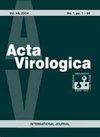在PPMV-1感染期间,trk融合基因通过抑制TBK1磷酸化负性调节干扰素信号
IF 0.8
4区 医学
Q4 VIROLOGY
引用次数: 0
摘要
trk融合基因(TFG, tropomyosin-receptor kinase fused gene)可负调控人细胞中视黄酸诱导基因(RIG)-I样受体(RLR)介导的干扰素(IFN)-I通路,从而参与副粘病毒感染过程。我们发现鸽子副粘病毒1型(PPMV-1)感染在感染细胞的早期阶段显著上调TFG的表达。我们推测PPMV-1可能通过上调IFN通路的负调节因子来抑制IFN的激活。通过RNAi敲低TFG蛋白表达,PPMV-1病毒复制水平下降,证实了这一假设,说明感染早期TFG上调有利于病毒复制。接下来,我们使用IFN-β启动子报告系统来评估TFG在IFN通路中的作用。结果显示,TFG可抑制RIG-I、MAVS(线粒体抗病毒信号蛋白)和TANK-binding kinase 1 (TBK1)刺激的IFN-β表达,但对干扰素调节转录因子3 (IRF3)激活的IFN-β没有抑制作用,提示TFG可能影响TBK1的功能,TBK1在IRF3的磷酸化中起重要作用。进一步实验表明,TFG抑制TBK1的磷酸化,导致IRF3无法被磷酸化。随后的IFN通路激活实验证实,过表达TFG后,IRF3磷酸化水平显著下调,而IFN-β启动子报告实验显示,TFG并不直接抑制IRF3激活的IFN应答。这证实了TFG蛋白通过抑制TBK1磷酸化负性调节IFN-β通路。本文章由计算机程序翻译,如有差异,请以英文原文为准。
The TRK-fused gene negatively regulates interferon signaling by inhibiting TBK1 phosphorylation during PPMV-1 infection
TRK-fused gene (TFG, tropomyosin-receptor kinase fused gene) is known to negatively regulate the retinoic acid inducible gene (RIG)-I-like receptor (RLR)-mediated interferon (IFN)-I pathway in human cells, thereby participating in the paramyxovirus infection process. We showed that pigeon paramyxovirus type 1 (PPMV-1) infection significantly upregulates TFG expression in infected cells at an early stage. We speculated that PPMV-1 would inhibit IFN activation by upregulating a negative regulator of the IFN pathway. This hypothesis was proved when TFG protein expression was knocked down by RNAi and the replication level of PPMV-1 virus decreased, which indicated that TFG upregulation in the early infection stage benefit virus replication. We next used the IFN-β promoter reporter system to evaluate the role of the TFG in the IFN pathway. The results showed that the TFG inhibited the IFN-β expression stimulated by RIG-I, MAVS (mitochondrial antiviral signaling protein) and TANK-binding kinase 1 (TBK1), but did not inhibit IFN-β activated by the interferon regulatory transcription factor 3 (IRF3), indicating that TFG may affect the function of TBK1, which play an important role in phosphorylation of the IRF3. Further experiments showed that the TFG inhibited the phosphorylation of TBK1, resulting in IRF3 being unable to be phosphorylated. Subsequent experiments on IFN pathway activation confirmed that the IRF3 phosphorylation level was significantly downregulated after overexpression of TFG, while the IFN-β promoter reporting experiment showed that TFG did not directly inhibit the IFN response activated by IRF3. This confirmed that TFG protein negatively regulates the IFN-β pathway by inhibiting TBK1 phosphorylation.
求助全文
通过发布文献求助,成功后即可免费获取论文全文。
去求助
来源期刊

Acta virologica
医学-病毒学
CiteScore
3.10
自引率
11.80%
发文量
43
审稿时长
>12 weeks
期刊介绍:
Acta virologica is an international journal of predominantly molecular and cellular virology. Acta virologica aims to publish papers reporting original results of fundamental and applied research mainly on human, animal and plant viruses at cellular and molecular level. As a matter of tradition, also rickettsiae are included. Areas of interest are virus structure and morphology, molecular biology of virus-cell interactions, molecular genetics of viruses, pathogenesis of viral diseases, viral immunology, vaccines, antiviral drugs and viral diagnostics.
 求助内容:
求助内容: 应助结果提醒方式:
应助结果提醒方式:


